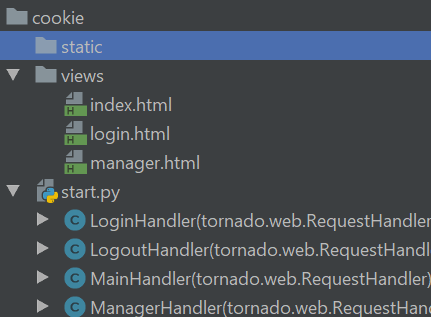cookie
服务端在客户端的中写一个字符串,下一次客户端再访问时只要携带该字符串,就认为其是合法用户。
tornado中的cookie有两种,一种是未加密的,一种是加密的,并且可以配置生效域名、路径、过期时间。
文件目录

Python代码

import tornado.ioloop import tornado.web import time class MainHandler(tornado.web.RequestHandler): def get(self): self.render('index.html', ) class ManagerHandler(tornado.web.RequestHandler): def get(self): cookie = self.get_cookie('auth') if cookie == '1': self.render('manager.html') else: self.redirect('/login') class LoginHandler(tornado.web.RequestHandler): def get(self): self.render('login.html', status_text='') def post(self): username = self.get_argument('username', None) password = self.get_argument('password', None) checked = self.get_argument('auto', None) if username == 'abc' and password == '123': if checked: self.set_cookie('usn', username, expires_days=7) self.set_cookie('auth', expires_days=7) else: expire_time = time.time() + 60 * 30 # domain:针对哪个域名生效 # path:为cookie划分权限,在那一些目录下生效,默认是'/',全局生效 self.set_cookie('usn', username, expires_days=expire_time) self.set_cookie('auth', '1', expires=expire_time, path='/') self.redirect('/manager') else: self.render('login.html', status_text='登陆失败') class LogoutHandler(tornado.web.RequestHandler): def get(self): self.set_cookie('auth', '1', expires=time.time()) self.set_cookie('usn', '', expires=time.time()) self.redirect('/login') settings = { "template_path": "views", # 配置html文件路径 "static_path": "static", # 配置静态文件路径 } # 路由映射 application = tornado.web.Application([ (r"/index", MainHandler), (r"/login", LoginHandler), (r"/manager", ManagerHandler), (r"/logout", LogoutHandler) ], **settings) # 启动 if __name__ == "__main__": application.listen(8888) tornado.ioloop.IOLoop.instance().start() # session更灵活些 # set_secure_cookie有了加密,更安全
HTML页面
index.html

<!DOCTYPE html> <html lang="en"> <head> <meta charset="UTF-8"> <title>Title</title> </head> <body> <h1>首页</h1> </body> </html>
login.html

<!DOCTYPE html> <html lang="en"> <head> <meta charset="UTF-8"> <title>Title</title> </head> <body> <form action="/login" method="post"> <input type="text" name="username"/> <input type="text" name="password"/> <input type="checkbox" name="auto" value="1" >7天免登陆 <input type="submit" value="登陆"/> <span style="color:red;">{{ status_text }}</span> </form> </body> </html>
manager.html

<!DOCTYPE html> <html lang="en"> <head> <meta charset="UTF-8"> <title>Title</title> </head> <body> <h1 style="color:red;">隐私页面</h1> <h1>您的密码是123456</h1> <h2>您的卡内余额是10000元</h2> <a href="/logout">退出</a> </body> </html>
这一部分没有复杂的部分,主要涉及了tornado内cookie相关方法的应用以及设计跳转页面间的关系。
